Implant-Supported Dentures
What Are Implant-Supported Dentures?
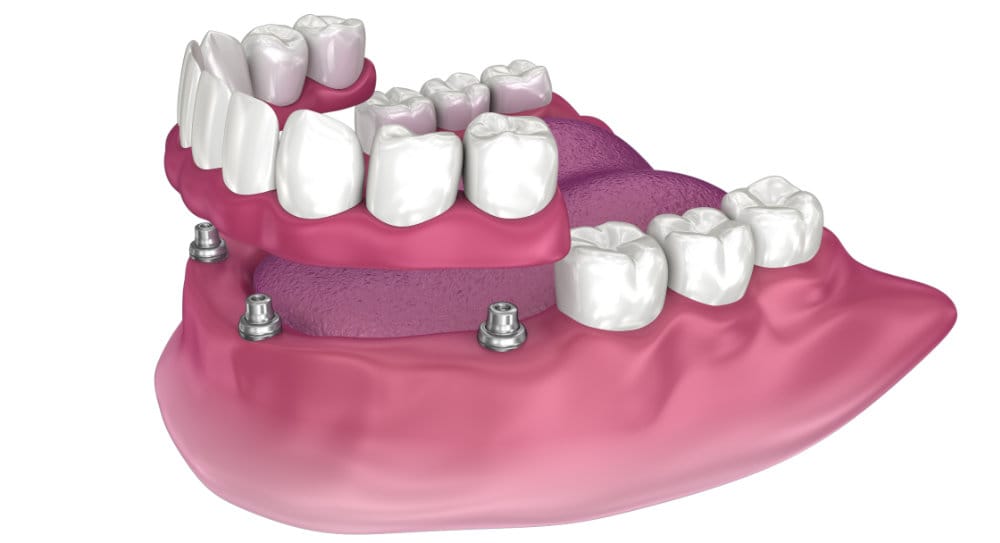
Implant-supported dentures, also known as snap-on dentures or overdentures, provide a stable and secure solution for patients who have lost most or all of their teeth. Unlike traditional dentures that can slip or shift while eating or speaking, implant-supported dentures are anchored firmly to dental implants, offering a more comfortable and natural experience.
HOW DO IMPLANT-SUPPORTED DENTURES WORK?
The process involves placing dental implants into the jawbone, which act as artificial tooth roots. Specialized connectors — such as ball-style or suction-type connectors — are then attached to the implants. A custom-made denture is designed to lock securely into place, significantly reducing movement and enhancing comfort.
- Implants are placed into the jawbone.
- Connectors, such as suction-type or ball connectors, are added.
- A denture is then custom-made to lock into these connectors, ensuring a secure fit.
WHO CAN BENEFIT FROM IMPLANT-SUPPORTED DENTURES?
- Patients with no remaining teeth (complete dentures).
- Patients with some remaining teeth (partial dentures) who need additional stability.
WHY CHOOSE IMPLANT-SUPPORTED DENTURES?
Compared to traditional dentures, implant-supported dentures offer:
- Improved Stability: No slipping or shifting while speaking or eating.
- Enhanced Comfort: Less irritation to the gums compared to traditional dentures.
- Natural Functionality: Allows you to bite and chew with confidence.
- Jawbone Preservation: Dental implants help stimulate the jawbone, reducing long-term bone loss.

EXPERT CARE WITH PROVEN RESULTS
Under the expert care of Dr. Javadi, a Board-Certified Periodontist and Diplomate of Periodontology and Implant Surgery, you can expect outstanding results with implant-supported dentures.
Dr. Javadi has placed thousands of dental implants over his career, utilizing advanced CT X-ray technology and 3D treatment planning software to ensure precision and high success rates. His commitment to excellence and patient care has made him a leading implant surgeon in the San Francisco Bay Area.
Since 2002, Dr. Javadi has provided advanced periodontal care and implant therapy to patients across Marin County and San Francisco. As the current President of the Marin County Dental Society, his commitment to continuing education and advancing patient care remains at the forefront of his practice.
When you choose implant-supported dentures at our practice, you’re not only restoring your smile but also placing your care in the hands of one of the most experienced implant surgeons in the region.
Ideal Candidates for Implant-Supported Dentures
- People who are dissatisfied with traditional dentures, particularly those that cause irritation, slip or shift excessively during eating or speaking, or feel uncomfortable for long-term wear.
- Patients seeking a more stable and reliable alternative, who are willing to invest a few thousand dollars for improved functionality, comfort, and confidence.
- Those who value a natural look, desiring dentures that stay securely in place while still being removable for easy cleaning and maintenance.
- People tired of relying on adhesives or dealing with the dietary restrictions often associated with loose-fitting traditional dentures.

Addressing Challenges with Traditional Dentures
For patients who experience a strong gag reflex or dissatisfaction with the coverage of the upper denture's palate, implant-supported dentures provide a great solution. By placing just two or more implants, your dentures can gain significant stability.
While upper dentures often have the advantage of suction against the roof of the mouth, lower dentures are more problematic due to the thinner bone structure of the lower jaw. This is why a majority of implant-supported denture cases focus on the lower jaw. However, patients unhappy with their upper dentures or those seeking improvements for both arches often choose upper or full-mouth implant support.
Dr. Javadi will evaluate your specific concerns and budget to guide you toward the best option.
Implant-supported dentures offer numerous benefits, including:
- Enhanced stability: No more slipping or discomfort.
- Relief from sore spots: Implants reduce reliance on gum suction.
- Improved chewing function: Enjoy your meals with confidence.
Traditional dentures rely solely on suction to stay in place, which can be limiting. Adding a couple of implants dramatically improves retention, giving you a more secure fit and greater overall comfort.
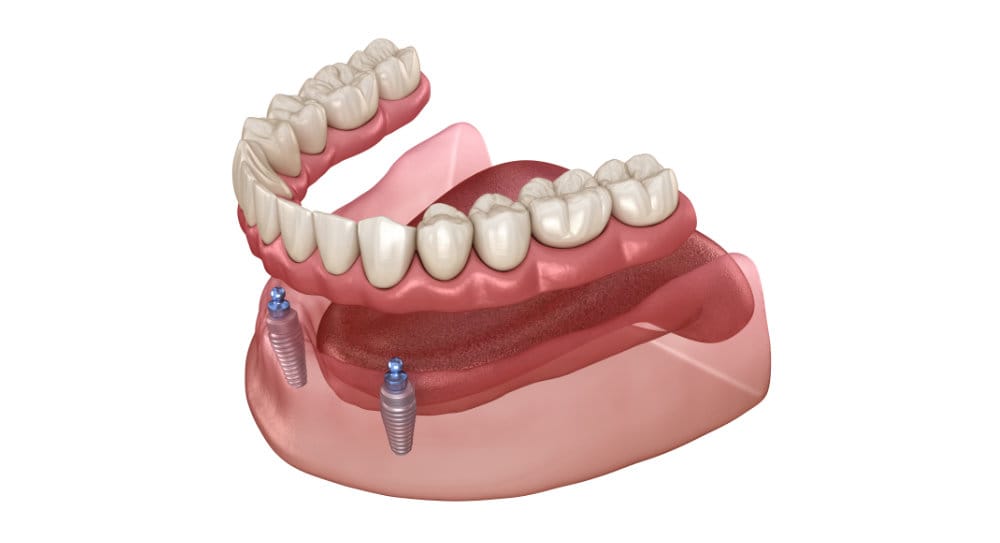
Benefits of Implant-Supported Dentures
Implant-supported dentures offer several advantages, making them a popular choice for individuals seeking improved denture stability:
- Implants help stabilize dentures, reducing gum irritation and discomfort.
- No more slipping or shifting dentures allowing you to speak, and smile with confidence. Chewing becomes easier and more comfortable.
- Smaller Upper Denture: Reduces coverage of the roof of the mouth, making it easier to breathe and speak.
- Implants are durable and typically last a lifetime.
- Even if dentures are lost or damaged, the implants remain intact, allowing for new dentures to be created without additional implant work.
- Implants help preserve jawbone structure, maintaining oral health in the long run.
- Compared to permanent teeth options like All On Four, implant-supported dentures are more affordable and quicker to complete.
- Implants are placed, and the gums are allowed to heal (typically within a month).
- Customizable Options: You can choose between suction-type or ball connectors based on Dr. Javadi's recommendation.
- Versatile Use: Works with both full and partial dentures.
- Dentures can then be adjusted to lock onto the implants.
- Minimal downtime, reduced pain, and fewer surgeries compared to full-mouth implants.

Implant-Supported Denture Treatment Options
When Considering Implant-Supported Dentures, You Have Several Options
Number of Implants
Choose the number of implants based on your needs/budget.
Connector Type
Suction-type or ball-style connectors.
Bar Attachments
For added stability in some cases.
BALL-STYLE ATTACHMENTS
(STUD ATTACHMENTS)

- Simpler Design: Easy to fabricate and less complex to maintain.
- Cost-Effective: Generally more affordable than bar attachments.
- Maintenance: Individual attachments are easier to replace if they wear out.
- Good Retention: Provides secure anchoring, reducing denture movement during daily activities like eating and speaking.
- Ease of Cleaning: The design allows for straightforward cleaning for patients.
- Retention Variation: May not provide as uniform retention as bar attachments, especially with multiple implants.
- Stress on Implants: Direct loading of individual implants can cause stress, particularly if the denture is not evenly balanced.
- Limited Applicability: May not be ideal for patients requiring a more rigid connection due to jaw structure or bone loss.
BAR-STYLE ATTACHMENTS
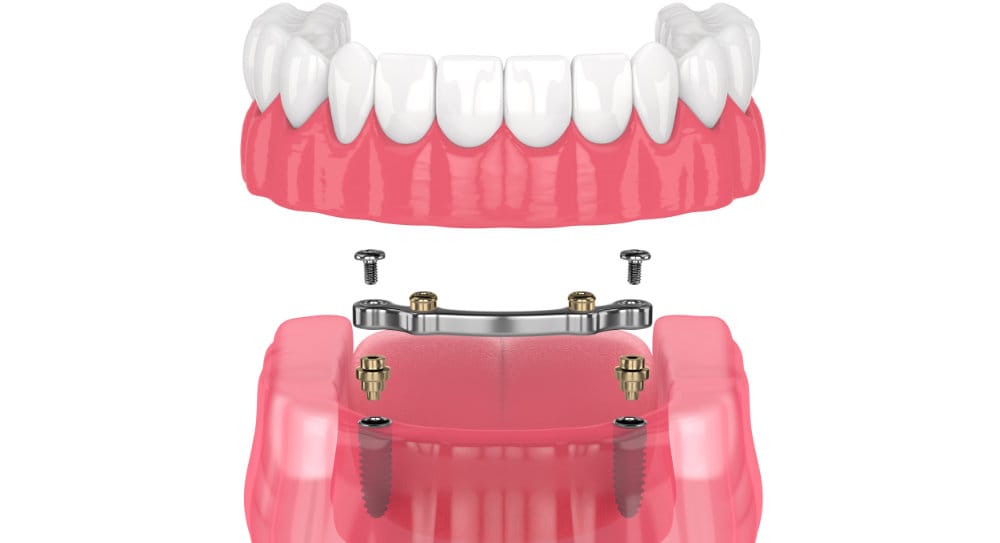
ADVANTAGES:
- Even Load Distribution: The bar connects multiple implants, distributing chewing forces evenly and reducing stress on individual implants.
- Enhanced Stability: Offers a more rigid connection, ideal for patients with higher functional demands.
- Customizability: Can be designed to suit various anatomical and functional requirements.
- Support for Severe Cases: Works well for patients with more advanced bone loss or challenging jaw anatomy.
DISADVANTAGES:
- Cost: More expensive due to the complexity of fabrication and additional materials.
- Hygiene Challenges: Requires meticulous cleaning, as the bar can trap food and plaque, increasing the risk of peri-implantitis.
- Complex Repairs: Repairs and adjustments may be more complicated and costly.
- Potential Bulkiness: Can feel bulky in the mouth, which may require adjustment time for patients.
CHOOSING BETWEEN BALL AND BAR-STYLE
The choice between ball-style and bar attachments depends on several factors:
- Patient's anatomy and bone support.
- Budget and willingness to maintain hygiene.
- Dr. Javadi’s recommendation based on functional and aesthetic needs.
For individuals with sufficient bone support and simpler needs, ball-style attachments are often ideal. For those needing greater stability and even force distribution, bar attachments might be the better option.
Each options advantages and costs, will be explain during your consultation.
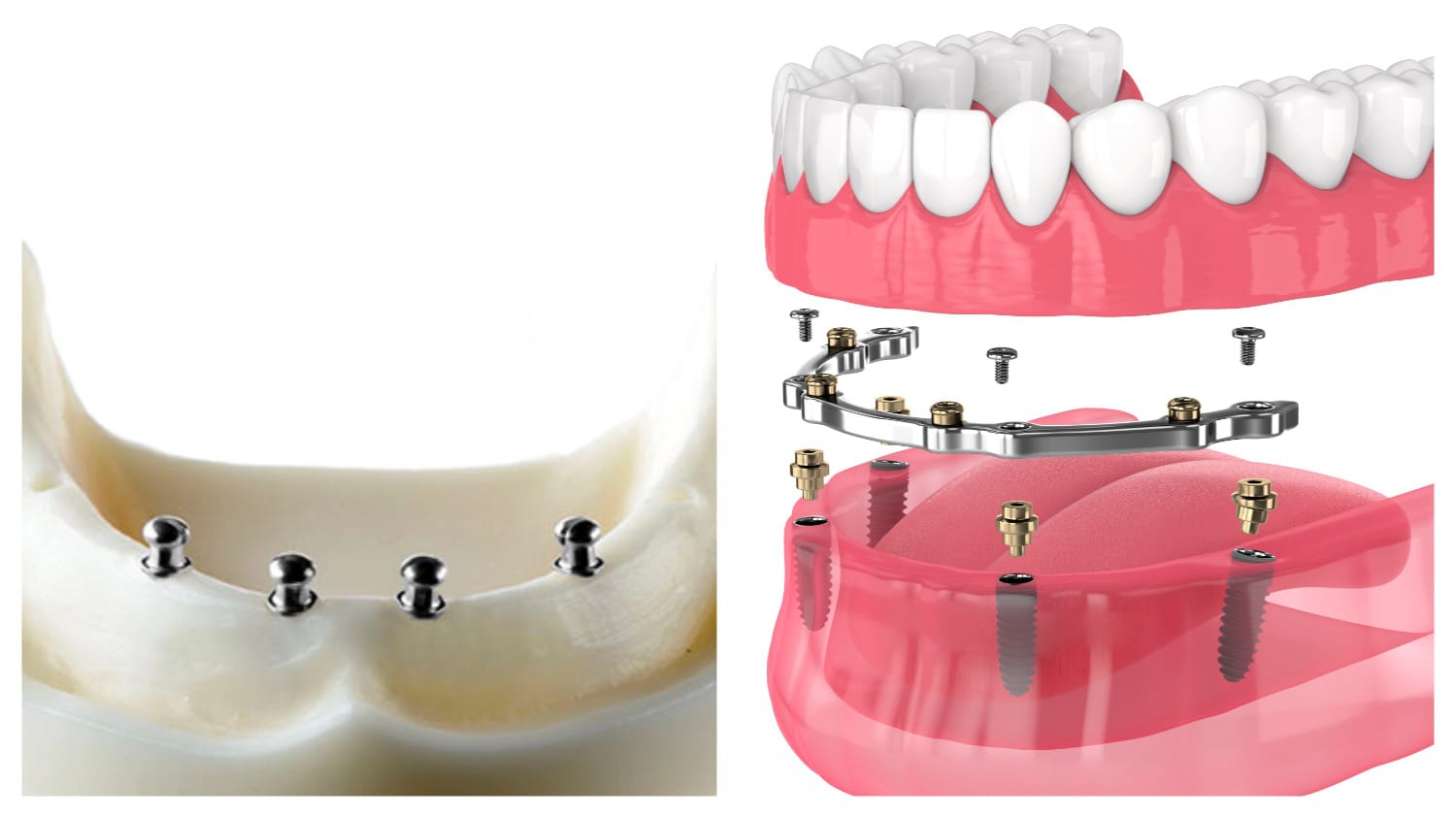
How Many Dental Implants?
- Affordable option providing bilateral stability.
- Ideal for moderate denture looseness.
- Required maintenance includes periodic O-ring replacements.
- Suitable for budget-conscious patients.
- Offers increased support and stability.
- Reduces chances of future issues (e.g., loose O-rings).
- Recommended for upper dentures if the palate is removed for comfort.
(MINIMUM FOUR IMPLANTS)
- Enhances denture tightness with a custom bar attached to implants.
- Drawback: Significant cost increase.
- Patients often opt for All On Four fixed teeth instead due to similar expenses.
Typical Implant Recommendations
- For full palate removal, 4 implants are recommended for stability.
- With 2 implants, some portion of the palate may need to remain for proper suction.
- Two implants suffice for mild looseness.
- Opt for four implants if the tongue creates discomfort or excessive denture movement.
- Patients can start with two implants and add more later if needed, but the process may incur additional costs and inconvenience.
- Discuss your specific needs and budget with Dr. Javadi to determine the best solution.
The Treatment Process for Implant-Supported Dentures
Treatment for implant-supported dentures involves two key components:
The Implants and the Denture.
- Initial Consultation: We evaluate your oral health and create a treatment plan.
- Implant Placement: Implants are surgically placed into the jawbone.
- Healing Period: Implants integrate with the bone over a few months.
- Denture Fitting: Your custom dentures are designed and fitted for optimal comfort and stability.
PLACING THE IMPLANTS
- Initial Placement: Typically, 2 or 4 dental implants are placed in the jaw. While some cases may require 3, 5, or 6 dental implants, the most common approach involves 2 or 4 implants.
- Healing Period: After placement, the implants need time to integrate with the jawbone—a process called osseointegration. This can take several weeks to months, depending on the individual.
- Attachment of Connectors: Once the implants heal, small connectors (called abutments) are attached. These will secure the denture in place.
WHAT TO EXPECT
The process of getting implant-supported dentures is generally less painful and more straightforward than many people expect. It comes with fewer complications compared to more advanced treatments like full-mouth implants or All On Four systems. Since fewer implants are needed and their placement is flexible, these dentures suit nearly everyone. Even patients with limited bone in certain areas often have enough bone in the front of the jaw to accommodate 2-4 implants.
With implant-supported dentures, you can enjoy a secure, comfortable fit, restoring your confidence and quality of life.
Overdentures: Maintenance and Long-Term Care
THEY’RE STILL DENTURES
- Even with improvements, patients must understand they are still living with dentures, albeit significantly improved dentures.
- While improved, chewing efficiency is not equivalent to natural teeth or permanent implants.
- They require removal for cleaning and may not eliminate psychological discomfort for those wanting a permanent solution like All On Four.
- Jawbone and cheek volume can still shrink over time.
DURABILITY AND WEAR
- Dentures can break if dropped or mishandled.
- Teeth wear down more quickly than permanent implants.
- Ongoing maintenance and adjustments require a skilled dentist.
- Relocating away from your dentist may complicate finding support for repairs or adjustments.
MAINTENANCE
- Components like O-rings may loosen and require replacement.
- Teeth and dentures may need periodic repairs or replacement.
- Annual or biannual dentist visits for maintenance ensure dentures remain tight and functional.
- Cost for maintenance: approximately $120–$250 per visit.
Cost of Implant-Supported Dentures
The cost of dental implants varies based on individual needs. Rather than a fixed price, your treatment plan is customized to ensure the best outcome for your oral health.
At Marin Reconstructive Periodontics, we focus on personalized care. Every patient receives a detailed consultation to determine the best treatment plan.
Schedule a Consultation
FACTORS THAT INFLUENCE THE COST OF IMPLANT-SUPPORTED DENTURES
- Number of Implants Needed: Some patients require only two implants, while others may need multiple implants or a full-arch restoration.
- Bone Density & Preparation: A strong foundation is essential. Some patients may need bone grafting or other preparatory procedures.
- Type of Restoration: The choice of materials and design for the final bridge, or denture influences the overall investment.
- Technology & Expertise: Advanced imaging, guided surgery, and the skill of your provider contribute to long-term success.
- Insurance & Financing Options: Coverage depends on your specific plan, but financing options are available for qualified patients to make treatment more accessible.
Comparing Implant-Supported Denture Options: Bar Attachment vs. All On Four
When considering implant-supported dentures, it's essential to understand the available options and their respective benefits. If you’re exploring the bar option, it might also be worthwhile to compare it to the All On Four system. Here’s why:
- All On Four generally provides superior stability and comfort if you're a suitable candidate.
- The cost difference between a bar system and All On Four is often negligible.
- With advancements in dental technology, bar systems may not be as beneficial as they once were, except in specific cases.
SUMMARY OF THE 3 MOST COMMON IMPLANT‑SUPPORTED DENTURE OPTIONS:
- Two-Implant Overdenture: Basic stability for loose dentures.
- Four-Implant Overdenture: Enhanced stability and comfort for daily use.
- Four Implants with a Stabilizing Bar: The tightest and most secure option for overdentures, ideal for those requiring maximum stability.
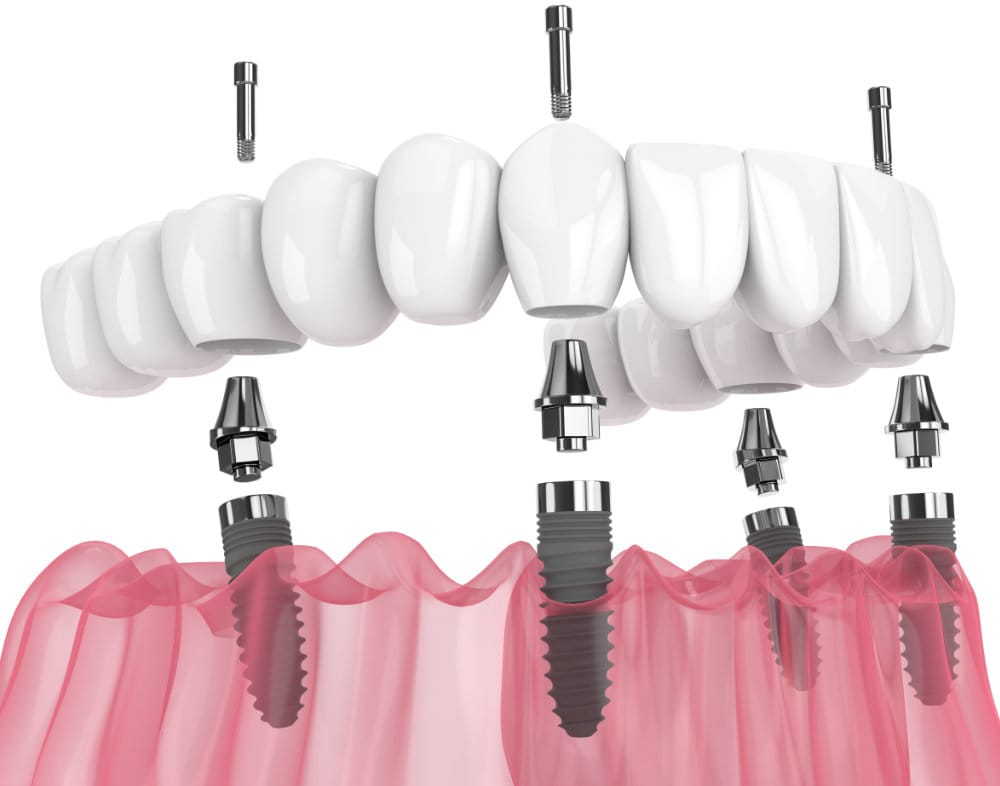
Insurance Coverage
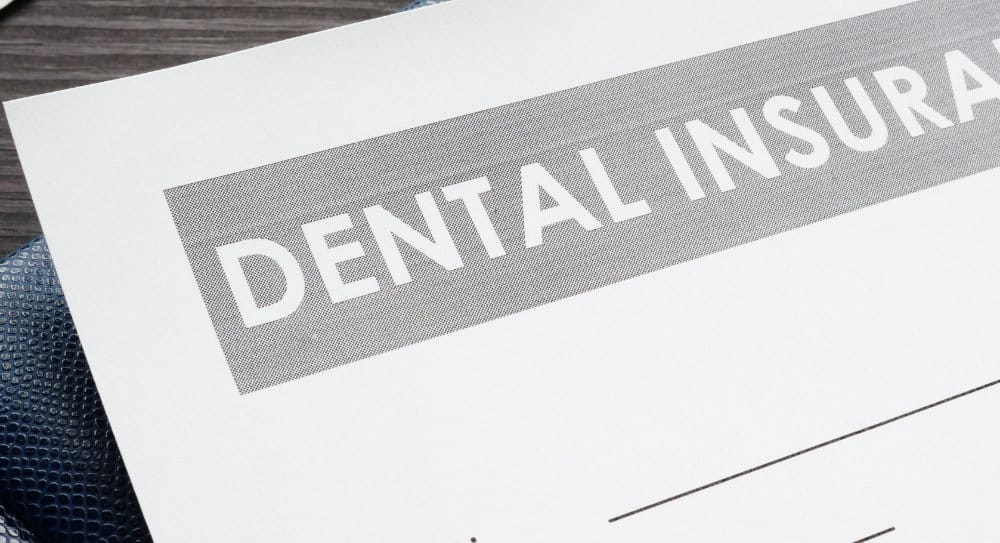
IMPLANTS:
- Rarely covered by dental insurance for overdentures.
DENTURES:
- Insurance may cover the cost of the dentures themselves.
- Reimbursement varies widely ($100–$2,000), depending on eligibility and coverage for new dentures.
SUGGESTIONS:
- Work with Dr. Javadi to determine out-of-pocket costs upfront.
- Submit claims to insurance for any possible reimbursement.
Patient Satisfaction
At Marin Reconstructive Periodontics, our priority is personalized care. We provide each patient with an in-depth consultation to identify the most suitable treatment options.
Implant-supported dentures are an excellent middle-ground solution for patients who want better dentures without the cost and commitment of permanent implants.
They provide significant improvements in chewing, comfort, and overall denture satisfaction.
As long as patients understand they are still wearing dentures, they will likely find this treatment life-changing.
- Most patients are highly satisfied with implant-supported dentures.
- Most patients never return for additional work apart from routine maintenance.
- A small percentage of patients later upgrade to All On Four or full-mouth implants, but this is rare.
Ready to Restore Your Smile?
If you’re tired of loose, uncomfortable dentures or are considering a more secure and natural solution, implant-supported dentures may be the perfect option for you. Schedule a consultation today with Dr. Javadi to learn how dental implants can transform your smile and quality of life.
